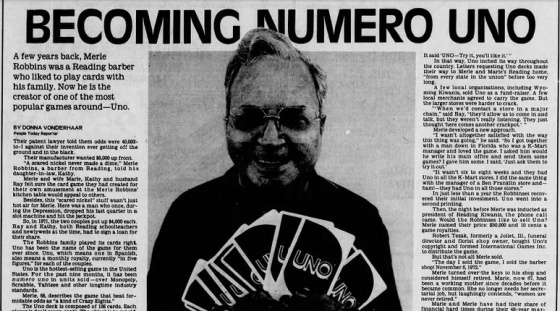
The story of UNO and its success is one of investment and taking risks (Ricketts, 2022). The game was invented by barber Merle Robins with the help of his family. They invented the game to settle an argument about the rules of the card game Crazy Eights. Robbins created his own deck and sold copies out of his barbershop. Seeing the success of UNO, Robbins and his family decided to invest their savings of $8000 in producing the first batch of 5000 copies of the game. Subsequently, they started to sell more and more copies, and the game started to appear on store shelves in Ohio. After gaining national success, funeral parlour and UNO fan Bob Tezak bought the game from Robbins for $50,000 plus royalties (BM Srl, 2021). Tezak and his small team, going by the name of International Games Incorporated, marketed UNO across the globe and designed its famous red cards and box as we know it today.
In the 1980s, UNO reached commercial success that had not been seen before, and multiple companies were interested in taking over UNO. However, Tezak only sold the brand UNO in 1996 to toy giant Mattel. UNO was the first successful game for Mattel. Mattel has created many different versions of UNO, and UNO is now being sold in 80 countries worldwide (BM Srl, 2021). The story of Robbins and UNO sounds textbook American Dream: a working-class man inventing a product, risking and investing all his money in it, and making it a success.

While UNO may seem like a simple no-nonsense card game, its rules and symbolism contain societal values. One of these values is individualism. The idea of being independent, and perhaps somewhat selfish, is reflected in UNO in many ways. For a start, players should keep their cards to themselves and not cooperate with others. After all, there can only be one winner in this game. Cooperation is possible, but only if it works in your favour. For example, if the player before you plays a +2 card, and you have a +2 card yourself, you can play your +2 card to make the player after you grab 4 cards and avoid having to grab 2 cards yourself. Another societal value that is incorporated into this game is the idea of fairness. As the rules of UNO leave room for different interpretations, the rules by which people play often differ between friend groups or families. Therefore, rules are often established beforehand in order to make the game fair. For example, some friend groups will allow players to play a +4 card on a +2 card, while others won’t. Having to communicate the rules to be played by before the match makes players discuss what they deem fair.